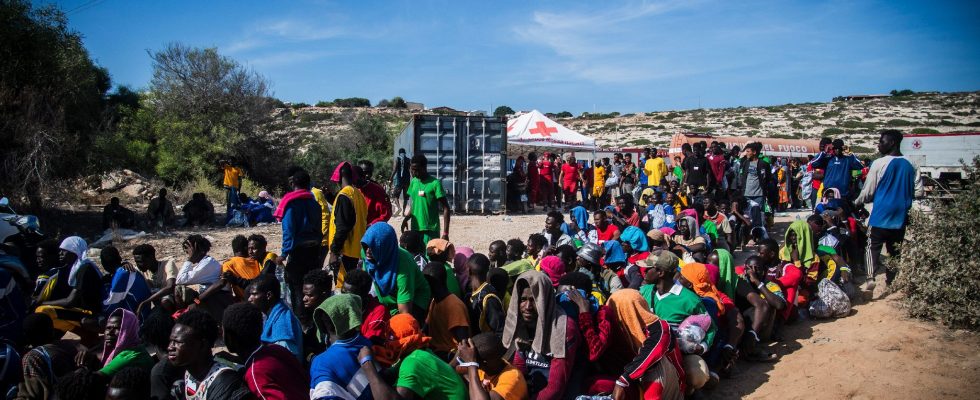Its population doubled in a few days. The Italian island of Lampedusa, located less than 150 kilometers from the Tunisian coast, has been facing an unprecedented influx of migrants since September 11. Between Monday and Wednesday, due to good weather conditions, 8,512 people, more than the entire local population, arrived aboard 199 boats, according to Federico Fossi, spokesperson for the High Commission for United Nations for Refugees (UNHCR). An “absolute record” wrote on X (ex-Twitter) Matteo Villa, from the think tank Italian Institute for International Political Studies (Ispi). The President of the European Commission, Ursula von der Leyen, has also planned to visit the island of Lampedusa this Sunday, accompanied by the Italian Prime Minister.
Most of these migrants were picked up at sea on makeshift boats by the coast guard. But some perished at sea. During the night from Tuesday to Wednesday, a five-month-old baby died after falling into the water, Filippo Mannino, the mayor of Lampedusa, said on Facebook, who declared municipal mourning. According to the United Nations (UN) migration agency, more than 2,000 people have died this year crossing between North Africa, Italy and Malta.
127,000 migrants have arrived in Italy since the start of 2023
Due to a lack of space in the reception center – designed to accommodate a maximum of 400 people – hundreds of people had to sleep outside, in the street, sometimes benefiting from the generosity of residents who brought them water and food. If migrants continued to arrive on the island, by their own means or rescued by the coast guard this Friday, September 15, 700 transfers had already taken place and 2,500 other people were expected to leave the island during the day of Saturday, according to the Italian Red Cross (CRI). “The migrants continue to arrive, but we manage them,” assured Friday morning, near the center, Francesca Basile, the head of migration at the CRI.
Close to Tunisia, Lampedusa is one of the first stops for migrants crossing the Mediterranean hoping to reach Europe. Every year, during the summer, tens of thousands of them take to the sea on often dilapidated boats to attempt this perilous crossing. In total, more than 127,000 migrants have landed on Italian shores since the start of the year, almost double compared to the same period in 2022.
The figures, however, have not yet surpassed those of 2016, when more than 181,000 people, many of them Syrians fleeing the war, reached Italy. Between 2016 and 2019, the influx of migrants into Italy fell due, in particular, to the migration pact concluded between the EU and Turkey. Signed after the 2015 migration crisis, it provided for the Turkish government to take care of migrants who had crossed into Europe illegally, including those whose right to asylum had been rejected. In return, Brussels committed to funding the reception and support of refugees on Turkish soil to the tune of 6 billion euros.
Migration crisis within the EU
This new migratory surge in Italy is thus relaunching the debate on the sharing of responsibilities within the European Union regarding asylum seekers. Despite a slight lull, Giorgia Meloni, the head of the Italian right-wing and far-right government, estimated Friday evening that the migratory pressure suffered by her country was “unsustainable” due to a “difficult international situation” , mainly in Africa. Italy criticizes its European partners for not mobilizing sufficiently to help it manage these flows. The day before, a spokesperson for the European Commission assured that Brussels was “in close contact” with Rome on the situation, specifying that Italy had already received 14 million euros in European funds to deal with this situation.
Ursula von der Leyen must therefore go to the island of Lampedusa this Sunday, at the request of the Italian leader, to observe the situation. Giorgia Meloni also called on the President of the European Council, Charles Michel, to put the migration issue on the agenda of the EU summit in October, while announcing that his government intended to take extraordinary measures.
In reaction to Italian concerns, French President Emmanuel Macron yesterday defended a “duty of European solidarity” with Rome while Berlin has just suspended the voluntary reception of asylum seekers from this country due to a “strong migratory pressure” and Italy’s refusal to apply European agreements.
However, Germany also seems ready to extend a hand to Rome, under condition: the relocations planned by the “voluntary European solidarity mechanism” can be reimplemented “at any time if Italy fulfills its obligation to take back the refugees” in accordance with EU rules, a German government spokesperson assured Friday.
